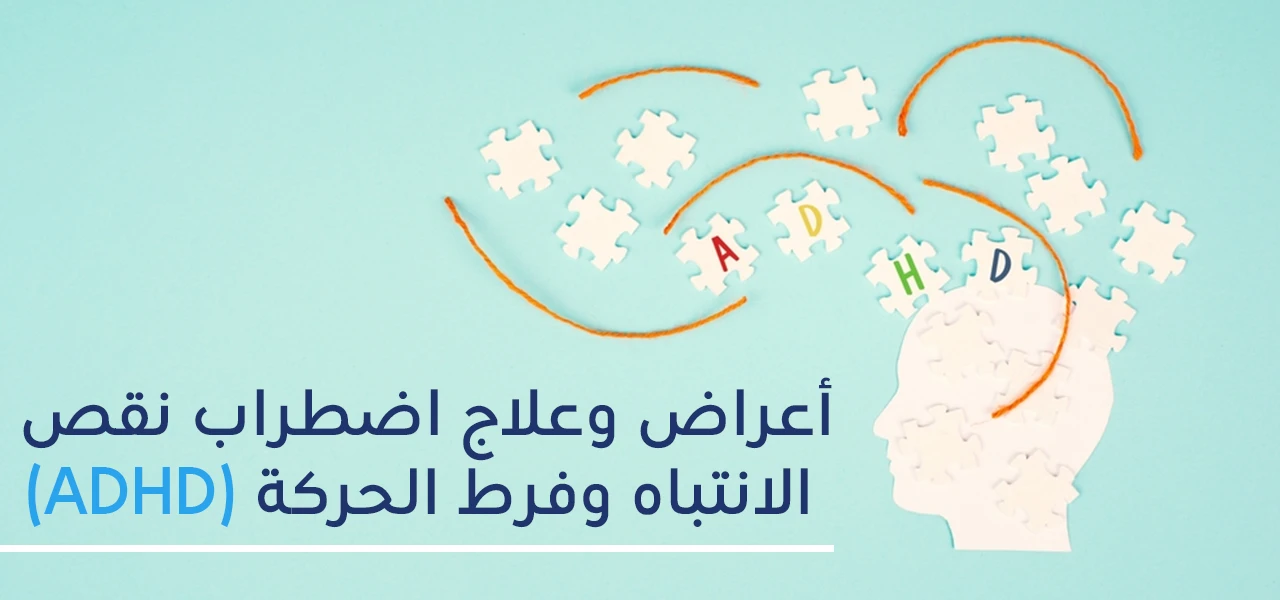ADHD - Symptoms and Treatment

ADHD is one of the diseases of our time, and it is hyperactivity and attention deficit disorder. Symptoms of ADHD are mild, moderate, or severe, and these symptoms may continue until adulthood.
There is no single accurate test that can determine whether a child has attention-deficit/hyperactivity disorder or not. To make a diagnosis of this disease, you must go to the doctor to conduct a comprehensive examination of the child, and then record the symptoms of attention-deficit/hyperactivity disorder that appear on the child. The specialist doctor also collects Information from the father, mother, family members, and the child’s teacher, after which treatment begins.
What are the types or stages of ADHD?
ADHD occurs more often in males than in females, as the behaviors indicating the disease are different between boys and girls. For example, boys may be more active than girls, while girls tend to be inattentive.
There are three different types of attention deficit hyperactivity disorder:
- The patient is inattentive most of the time, as most of the symptoms fall under neglect.
- The child is hyperactive or impulsive most of the time, and this is where most of the symptoms of impulsivity and hyperactivity occur.
- The disease is mixed, with symptoms of hyperactivity, inattention, and impulsivity.
The most prominent symptoms of ADHD
A child with ADHD experiences some symptoms, which we can mention as follows:
- Failure to pay great attention to detail.
- He made multiple reckless mistakes during the school day.
- Trouble concentrating on various tasks or while playing.
- The child seems not to listen, even when spoken to directly.
- The child has difficulty following instructions.
- Failure to complete required school work or household chores as well.
- Problems organizing time, tasks, and activities
- Avoid tasks that require focused mental effort, such as homework.
- Missing items needed for activities or tasks, such as school assignments, toys, and pencils.
- Easily distracted.
- Forgetting to do many daily activities, such as forgetting to work on household chores.
When do ADHD symptoms start?
Symptoms of ADHD and attention deficit disorder begin to be noticed in children before the age of 12 years.
These symptoms are very noticeable early, starting at the age of three years in some children.
A child with ADHD shows hyperactivity and symptoms of impulsive behavior, for example:
- The child is fidgeting or squirming in the chair.
- He finds it difficult to sit in class or in any other situation.
- It continues to move while sitting in constant movements.
- Someone with ADHD runs around.
- He can climb at times that are not appropriate.
- He finds it difficult to do activities quietly or play.
- He talks a lot and fast.
- He is a nervous person to a degree unusual for humans.
Types of ADHD treatment
You can help reduce the risk of children developing ADHD through some of the following:
- During pregnancy, the mother should avoid anything that could harm the growth of the fetus, such as: avoiding drinking various alcoholic beverages or using smoking or recreational drugs.
- Protecting the child from exposure to pollutants and toxins, as these include lead paint and cigarette smoking.
- Reducing periods of watching television, would be wise to prevent many children from watching screens and relying on video games excessively in the first five years of their lives.
ADHD can be improved through treatment, without considering complete recovery, as there are three different types of treatment:
- Medication only: There are medications that help in treatment, such as non-stimulating atomoxetine and some antidepressants such as bupropion, which are stimulants. This medication helps children focus, remain calm, and learn.
- Therapy only: Behavioral therapy and other types of treatments help teach children how to manage their behaviors and improve overall performance.
- Medication and therapy together: Some children improve if medication and therapy are used together.
Is ADHD a mental illness?
No, ADHD is attention deficit hyperactivity disorder, but it does not fall under the category of psychological problems. However, children with this disease are more susceptible than other children to developing certain diseases, such as mood disorders such as symptoms of bipolar disorder or depression.
Therefore, ADHD is not a mental illness in itself, but it can bring many other psychological illnesses to the patient who suffers from it.
Is ADHD serious?
There are some complications that make ADHD dangerous to the life of the sufferer and make it more difficult, especially for children, as these children in the classroom become infected with ADHD, and this causes the children to fail academically, and to be judged by other children as well as other adults on the child as failure and neglect.
At this time, more injuries and accidents of all kinds may occur to children who suffer from ADHD than to children who do not have such a disease.
Here we conclude that ADHD is one of the diseases that affects children in early childhood, and this disorder can be dealt with well through the awareness of all family members about the methods of diagnosing this disease, and many of the symptoms that accompany it, while helping the child with many of the tips that we mentioned in this article.
